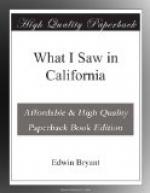“November 27 and 28.—To-day we started a few minutes after sunrise. Our course was a winding one, to avoid the sand-drifts. The Mexicans had informed us that the waters of the salt lake, some thirty or forty miles distant, were too salt to use, but other information led us to think the intelligence was wrong. We accordingly tried to reach it; about 3, P.M., we disengaged ourselves from the sand, and went due (magnetic) west, over an immense level of clay detritus, hard and smooth as a bowling-green. The desert was almost destitute of vegetation; now and then an Ephedra, Oenothera, or bunches of Aristida were seen, and occasionally the level was covered with a growth of Obione canescens, and a low bush with small oval plaited leaves, unknown. The heavy sand had proved too much for many horses and some mules, and all the efforts of their drivers could bring them no further than the middle of this desert. About 8 o’clock, as we approached the lake, the stench of dead animals confirmed the reports of the Mexicans, and put to flight all hopes of being able to use the water.
“The basin of the lake, as well as I could judge at night, is about three-quarters of a mile long and half a mile wide. The water had receded to a pool, diminished to one half its size, and the approach to it, was through a thick soapy quagmire. It was wholly unfit for man or brute, and we studiously kept the latter from it, thinking that the use of it would but aggravate their thirst. One or two of the men came in late, and, rushing to the lake, threw themselves down and took many swallows before discovering their mistake; but the effect was not injurious except that it increased their thirst. A few mezquite trees and a chenopodiaceous shrub bordered the lake, and on these our mules munched till they had sufficiently refreshed themselves, when the call to saddle was sounded, and we groped silently our way in the dark. The stoutest animals now began to stagger, and when day dawned scarcely a man was seen mounted.
“With the sun rose a heavy fog from the south-west, no doubt from the gulf, and, sweeping towards us, enveloped us for two or three hours, wetting our blankets and giving relief to the animals. Before it had disappeared we came to a patch of sun-burned grass. When the fog had entirely dispersed we found ourselves entering a gap in the mountains, which had been before us for four days. The plain was crossed, but we had not yet found water. The first valley we reached was dry, and it was not till 12 o’clock, M., that we struck the Cariso (cane) creek, within half a mile of one of its sources, and although so close to the source, the sands had already absorbed much of its water, and left but little running. A mile or two below, the creek entirely disappears. We halted, having made fifty-four miles in the two days, at the source, a magnificent spring, twenty or thirty feet in diameter, highly impregnated with sulphur, and medicinal in its properties.




